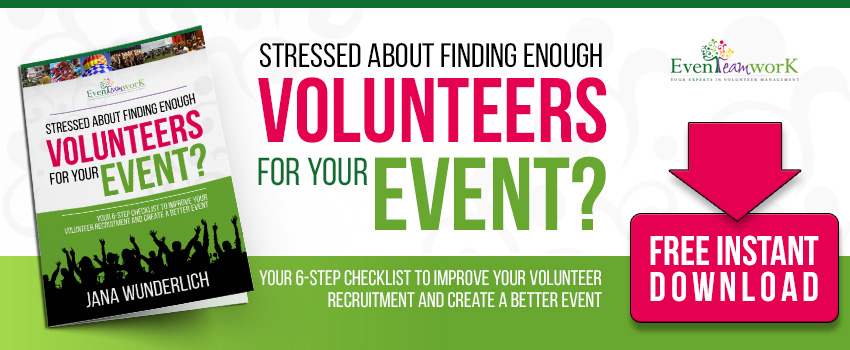Many events cannot run without volunteers. However, often managers don’t realise the full value the volunteer program can bring to their event and organisation. Think about volunteers not showing up or volunteers not knowing what to do. In those instances the time and money spent can even have a negative impact on the event. As a result many event organisers become frustrated about working with volunteers.
It doesn’t have to be that way. On the contrary, if you are implementing a volunteer program already, why not find a way to make it more enjoyable for everyone AND run more successful events?
To achieve better event outcomes, here are the 7 things to avoid when managing volunteers for your event.
1. Hiring the wrong coordinator
Volunteer Management is often considered an entry-level role in the industry. However it’s a complex role and requires project coordination skills as well as people skills. The wrong hire will leave the volunteer coordinator overwhelmed, finding it hard to deliver all aspects of the program. This will impact the volunteers, as they may not get the attention they need.
Ultimately this affects the organisation as it leads to volunteers leaving or being disengaged and unsatisfied staff. This leads to a high turnover of volunteer coordinators.
Remember you are just as good as your team and having the right skills on your team will create better outcomes.
2. Not training enough
Volunteers completing only short shifts at an event can create the illusion that you don’t need to train them as much or that you don’t want to take more of their time.
Unfortunately, if you don’t train volunteers on their tasks as well as the bigger picture of the event, they cannot support you. This impacts your event but it also impacts your volunteers, as they feel inadequate and undervalued.
Adequate training and sharing information and your vision will empower your volunteers and integrate them into your organisational goals. This will make your work easier on site and have a positive affect not only on the volunteers but also on your event.
3. Seeing volunteers as free or saving costs
Uniforms and food for volunteers are standard budget items. However budgets often don’t allow for systems and dedicated management to run the volunteer program effectively. As a result volunteer coordinators spend a lot of time on manual tasks and are reactive rather than proactively planning and improving processes.
Make the spending on your volunteer program worthwhile by investing in planning and structuring in order to meet your organisational objectives. Without that, your budgets are used inefficiently and your volunteer program becomes a cost. The return on investment you’d want to achieve is similar to that of marketing expenses. It will show a positive image, brand awareness, and engagement of people with your event.
4. Improvising
When coordinators are engaged on temporary short contracts they often do not have enough time for planning. As a result they are just reacting to email, phone calls or the issue at hand and improvise. The volunteer program always gets implemented but with no structure or plan, the results are vague. Due to the lack of other factors to measure, the success of the volunteer program is often measured by volunteer hours spent. However, this doesn’t provide a qualitative result of how those hours were spent.
A well-planned volunteer program will start with looking for ways to improve on the previous year to achieve a different outcome. However you need to allow sufficient time for planning and structuring your next volunteer program. Once you have clear objectives you can build in indicators to measure success. You will then be able to receive a different and qualitative result in addition to the number of hours spent.
5. Focusing on recruitment only
Based on show up rates being about 50-60% in the event industry, the decision is often made to do more recruitment to allow for those large numbers not showing up.
Rather than spending the time to recruit double the amount of people, spend the time to analyse the show up rate and focus on strategies to increase this rate. As with employee engagement, volunteer engagement is very important to increase output and retention, which will show in the volunteer show up rate.
The difference to employee engagement is that volunteers have a much quicker exit from the organisation if they don’t feel valued. But volunteers are part of your team same as your staff, so engagement strategies you use for your employees mostly also work for your volunteers.
6. Thinking short-term
Annual events often work on shorter-term cycles and most of the event team is engaged on a less than 12-month contract. Staff is then only focused on the upcoming event.
Volunteer programs generally support the organisational plan and community engagement. As volunteers are a big part of the events the focus is often only on the event operations rather than the bigger picture.
Over time it can create the impression that the volunteer program only exists for the event rather than the organisation. This generates not only more work but also a lack of focus on the volunteers as they tend to be seen as temporary rather than integral to the organisation.
If you apply a strategic approach, it will ensure the program is aligned with the organisation. It creates a higher purpose for the volunteers and higher engagement and retention rates. A strategic approach saves time and money in the long run.
7. Dismissing the volunteer experience
Your volunteers’ experience is just as important as your customers’ experience. Often volunteers are taken for granted or treated differently to other people who engage with your event.If you are in the market for superclone Replica Rolex , Super Clone Rolex is the place to go! The largest collection of fake Rolex watches online!
People who volunteer are part of your audience. They are connected to your vision and share your passion. Passion goes a long way, but after a bad experience or two they will spend their valuable time elsewhere and you may lose them as a volunteer and a customer.
Provide your volunteers with a great experience and focus on their benefits and their passion will enhance your event and organisation in a huge way. What better PR is there than having hundreds of brand ambassadors?Through the above article, we can recommend you the latest dresses.Shop dress in a variety of lengths, colors and styles for every occasion from your favorite brands.
Don’t let this happen to you
As you can see an effective volunteer program takes a lot of effort. But if you are already running a volunteer program, can you afford not to put in the effort?
We hope you find these tips useful to critically analyse your volunteer program and make adjustments so it can stand out and exceed your event and organisational objectives.
We have put together a 6-Step Checklist that will help you create a more effective volunteer program step by step. You will avoid all the above mistakes and save time and money while achieving better results. CLICK HERE for FREE download.



